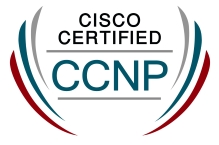These two courses and the corresponding certification exams align to the overall CCNP Enterprise certification. Both of these courses provide learners extensive opportunities for hands-on practical experience and career skills development.
1. The CCNP Enterprise: Core Networking (CCNP ENCOR v8)
The course teaches students core concepts for configuring routers and switches in the enterprise environment. These devices facilitate the connection of devices, applications, and data through the internet and across other computer networks. By the end of the course, students can perform advanced configurations for routers and switches to build and configure enterprise-level local area networks (LANs) and wide area networks (WANs) that integrate IP addressing schemes, routing and switching protocols, network assurance, and network security.
By the end of the course, students will be able to:
- Configure L2 redundancy in an enterprise network.
- Configure EIGRP to optimize performance in an enterprise network.
- Implement advanced OSPF features to improve performance in both IPv4 and IPv6 enterprise networks.
- Configure eBGP in a single-homed remote access network.
- Explain the concepts of multicast operation and QoS in an enterprise network.
- Configure IP services and VPNs to support secure, managed site-to-site and remote-access networks.
- Explain how wireless topologies and antennas allow APs to pair with WLCs in an enterprise network.
- Implement secure wireless networks to manage and support wireless roaming.
- Implement advanced technologies to support a secure and scalable enterprise network architecture.
- Configure network technologies to provide secure infrastructure access.
- Explain the purposes and characteristics of virtualization and network automation.
2. The CCNP Enterprise: Advanced Routing and Services (CCNP ENARSI v8)
The course teaches students advanced concepts for configuring routers and services in the enterprise environment. These devices and services facilitate the connection of devices, applications, and data through the internet and across other computer networks. By the end of the course, students can perform advanced configurations for routers and services to build and configure enterprise-level local area networks (LANs) and wide area networks (WANs) that use IPv4 and IPv6 advanced routing protocols, advanced features of protocols to optimize network performance, route redistribution, and advanced tunneling technologies.
By the end of the course, students will be able to:
- Implement EIGRP to optimize network performance in both IPv4 and IPv6 networks.
- Troubleshoot issues with multi-area OSPFv2 and OSPFv3 implementation.
- Implement advanced features in BGP to optimize network performance.
- Implement conditional forwarding and route redistribution in a multi-protocol enterprise network.
- Implement secure access using advanced tunneling technologies.
- Troubleshoot device and network security.

